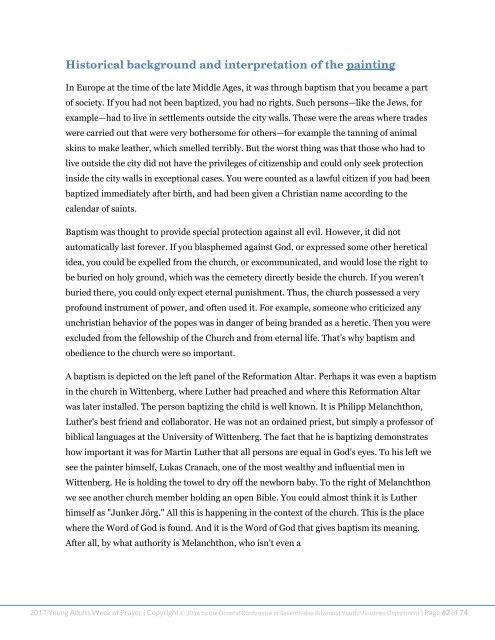Temario Semana de Oración JA - Ingles Asociación General
Create successful ePaper yourself
Turn your PDF publications into a flip-book with our unique Google optimized e-Paper software.
Historical background and interpretation of the painting<br />
In Europe at the time of the late Middle Ages, it was through baptism that you became a part<br />
of society. If you had not been baptized, you had no rights. Such persons—like the Jews, for<br />
example—had to live in settlements outsi<strong>de</strong> the city walls. These were the areas where tra<strong>de</strong>s<br />
were carried out that were very bothersome for others—for example the tanning of animal<br />
skins to make leather, which smelled terribly. But the worst thing was that those who had to<br />
live outsi<strong>de</strong> the city did not have the privileges of citizenship and could only seek protection<br />
insi<strong>de</strong> the city walls in exceptional cases. You were counted as a lawful citizen if you had been<br />
baptized immediately after birth, and had been given a Christian name according to the<br />
calendar of saints.<br />
Baptism was thought to provi<strong>de</strong> special protection against all evil. However, it did not<br />
automatically last forever. If you blasphemed against God, or expressed some other heretical<br />
i<strong>de</strong>a, you could be expelled from the church, or excommunicated, and would lose the right to<br />
be buried on holy ground, which was the cemetery directly besi<strong>de</strong> the church. If you weren't<br />
buried there, you could only expect eternal punishment. Thus, the church possessed a very<br />
profound instrument of power, and often used it. For example, someone who criticized any<br />
unchristian behavior of the popes was in danger of being bran<strong>de</strong>d as a heretic. Then you were<br />
exclu<strong>de</strong>d from the fellowship of the Church and from eternal life. That’s why baptism and<br />
obedience to the church were so important.<br />
A baptism is <strong>de</strong>picted on the left panel of the Reformation Altar. Perhaps it was even a baptism<br />
in the church in Wittenberg, where Luther had preached and where this Reformation Altar<br />
was later installed. The person baptizing the child is well known. It is Philipp Melanchthon,<br />
Luther's best friend and collaborator. He was not an ordained priest, but simply a professor of<br />
biblical languages at the University of Wittenberg. The fact that he is baptizing <strong>de</strong>monstrates<br />
how important it was for Martin Luther that all persons are equal in God's eyes. To his left we<br />
see the painter himself, Lukas Cranach, one of the most wealthy and influential men in<br />
Wittenberg. He is holding the towel to dry off the newborn baby. To the right of Melanchthon<br />
we see another church member holding an open Bible. You could almost think it is Luther<br />
himself as "Junker Jörg." All this is happening in the context of the church. This is the place<br />
where the Word of God is found. And it is the Word of God that gives baptism its meaning.<br />
After all, by what authority is Melanchthon, who isn't even a<br />
2017 Young Adults Week of Prayer | Copyright © 2016 by the <strong>General</strong> Conference of Seventh-day Adventist Youth Ministries Department | Page 62 of 74






